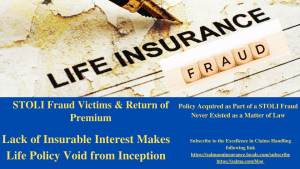STOLI Fraud Victims & Return of Premium

See the full video at https://www.youtube.com/watch?v=3nU4wgZ0xbg and at https://rumble.com/v1jf39j-stoli-fraud-victims-and-return-of-premium.html
Policy Acquired as Part of a STOLI Fraud Never Existed as a Matter of Law
In Geronta Funding, a Delaware Statutory Trust v. Brighthouse Life Insurance Company, No. 380, 2021, Supreme Court of Delaware (August 25, 2022) the Supreme Court was asked to determine whether premiums paid on insurance policies declared void ab initio for lack of an insurable interest should be returned. The trial court agreed with Brighthouse and relied on the Restatement (Second) of Contracts (the “Restatement”) to determine whether Geronta was entitled to restitution. Specifically, the court held that Geronta may obtain restitution under Section 198 of the Restatement (“Section 198”) if it could prove excusable ignorance or that it was not equally at fault.
Applying this test, the court ruled that Geronta was only entitled to the return of the premiums it paid after alerting Brighthouse to the void nature of the policy at issue.
RELEVANT FACTS AND BACKGROUND
On July 11, 2007, the fictitious Mansour Seck Irrevocable Life Insurance Trust (the “Seck Trust”) applied to MetLife Investors USA Insurance Company (Brighthouse’s predecessor) for a $5 million universal life insurance policy insuring the life of a fictitious man identified as Mansour Seck (the “Policy”), with a birthday of January 1, 1933. Seck was identified as a French citizen residing at 170 Academy Street, Jersey City, New Jersey.
After confirming that its procedures and guidelines were met, MetLife issued the Policy on or around July 24, 2007.
Pape Seck’s Arrest and Prosecution
In 2010, Pape Seck was the subject of numerous press releases issued by the State of New Jersey and other insurance industry publications; they stated that Pape Michael Seck, a New York City insurance agent, had been arrested and prosecuted for fraudulent insurance schemes. Pape Seck pleaded guilty to two counts of insurance fraud concerning fraudulent applications for Mansour Seck.
Litigation and the Superior Court Ruling
On April 4, 2018, Brighthouse filed suit, seeking a judicial declaration that the Policy was void ab initio for lack of an insurable interest and arguing that it is entitled to keep all the premiums paid on the Policy. Geronta filed an answer, agreeing that the Policy was void ab initio, and a counterclaim, alleging that it was entitled to reimbursement of all premiums paid, with the exception of the premiums paid by the original owner of the Policy.
In its opinion, the trial court declared the Policy void ab initio. The court denied Geronta’s request for rescission and disgorgement, holding that rescission is not available where a contract is void because there is no contract to “unmake.” After trial, the Superior Court ruled that Geronta was only entitled to restitution of the premiums it paid after it informed Brighthouse that the Policy was void for lack of an insurable interest.
ANALYSIS
Overview of Potential Remedies for an Insurance Policy That Is Void Ab Initio for Lack of an Insurable Interest
A contract of insurance upon a life in which the insured has no interest is a pure wager that gives the insured a sinister counter interest in having the life come to an end. A court may never enforce agreements void ab initio, no matter what the intentions of the parties. Thus, when an agreement is void ab initio as against public policy, the courts typically will not enforce a remedy to any extent against either party. In other words, the courts typically will leave the parties where they find them.
Was Rescission Available?
Rescission would result in the return of any premiums paid by applying equitable principles and putting both parties back in the position they were in before the contract was made. Stranger-originated life insurance (“STOLI”) policies, like the one for Monsour Seck, when rescinded would require return of the premiums from the insurer to the investor. However, since the policy was void rescission was not available.
Restitution
Restitution is a body of substantive law in which liability is based not on tort or contract but on the defendant’s unjust enrichment. Restitution has been awarded under two separate approaches: (1) a fault-based analysis grounded in considerations specific to insurance policies declared void ab initio for lack of an insurable interest and (2) the Restatement.
Restitution Under A Fault-Based Analysis Grounded In Considerations Specific To Insurance Policies Declared Void Ab Initio For Lack Of An Insurable Interest
Most courts considering this issue have adopted a fault-based analysis in determining whether to return premiums paid on an illegal or void insurance policy.
Generally when an illegal contract is voided, the parties will be left where they have placed themselves with no recovery of the money paid for illegal services. But there is an exception for the case in which the party that made the payments is not to blame for the illegality. The Insurers were the clear victims of the STOLI scheme as was Geronta who bought the policy.
If the downstream investor was equally at fault with, or more at fault than, the insurer, the the trial court should leave the parties where it found them, allowing the insurer to keep the premiums. If the downstream investor was innocent or the insurer was more at fault, the court should return the premiums.
The Restatement (Second) of Contracts
Restatement Section 198 lays out two exceptions to the general rule-when a party is (1) excusably ignorant and (2) not equally in the wrong with the party from whom he seeks restitution.
The Supreme Court adopted a fault-based analysis, framed under the Restatement, that considers questions specific to insurance policies declared void ab initio as against public policy for lack of an insurable interest as the correct test to determine whether premiums should be returned.
The Supreme Court noted that a fault-based analysis incentivizes insurers to speak up when the circumstances suggest that a policy is void for lack of an insurable interest because they will not be able to retain premiums if they stay silent after being put on inquiry notice, and they might also be responsible for interest payments.
Thus, when analyzing a viable legal theory that seeks as a remedy the return of premiums paid on insurance policies declared void ab initio for lack of an insurable interest, Delaware courts are now required to analyze the exceptions outlined in Sections 197, 198, and 199 of the Restatement and determine whether any of those exceptions permit the return of the premiums. A court needs to determine whether:
there would be a disproportionate forfeiture if the premiums are not returned;
the claimant is excusably ignorant;
the parties are not equally at fault;
the party seeking restitution did not engage in serious misconduct and withdrew before the invalid nature of the policy becomes effective; or
the party seeking restitution did not engage in serious misconduct, and restitution would put an end to the situation that is contrary to the public interest.
The fault of the parties and public policy considerations will determine which party is entitled to the premiums paid on an insurance policy that is void ab initio for lack of an insurable interest.
The Superior Court Failed to Consider Whether Either Party Had Inquiry Notice of the Void Nature of the Policy
Here, prior to purchase:
Geronta, in consultation with Leadenhall, made the deliberate decision to superficially look at the Seck Policy by solely focusing on whether it was active.
Geronta purposefully ignored the possibility that some of the unexamined policies in the bulk purchase might have been unenforceable.
Geronta’s due diligence as to the Seck Policy was extremely limited.
The Superior Court also concluded that Brighthouse was not at fault because Geronta failed to show that Brighthouse had actual knowledge of the void nature of the Policy. In other words, the Court found that Brighthouse did not have actual knowledge of the Policy’s illegality.
Section 198 and the in pari delicto cases from Section III.A.b.i focus on whether a party had either actual knowledge or inquiry notice of the invalidity of the policy. Since the trial Court failed to consider whether Bighthouse was on inquiry notice of the void nature of the Policy.
The Supreme Court remanded the case for the Superior Court to reconsider its factual findings in light of this Court’s articulated test and specifically direct the court to consider whether either party had inquiry notice of the void nature of the Policy and reversed the court’s holdings regarding entitlement to premiums and remanded the case for consideration consistent with its opinion.
By waiting two years after inception of the policy for the fake insured the fraudsters defeated the ability of the insurer to rescind because of a life insurance policy’s noncontestability clause. However, since Mansour Seck did not exist the policy was not real, it was a gamble and a fraud, that the criminal invested a great deal of money, sold the risk to another and profited from the crime only to have the victim sell again until Geronta found itself paying premium on a void policy. To do justice the Delaware Supreme Court has provided a means to determine who is free of guile and who is not when deciding who gets the premium back, if anyone.

(c) 2022 Barry Zalma & ClaimSchool, Inc.
Barry Zalma, Esq., CFE, now limits his practice to service as an insurance consultant specializing in insurance coverage, insurance claims handling, insurance bad faith and insurance fraud almost equally for insurers and policyholders. He practiced law in California for more than 44 years as an insurance coverage and claims handling lawyer and more than 54 years in the insurance business. He is available at http://www.zalma.com and zalma@zalma.com.
Subscribe and receive videos limited to subscribers of Excellence in Claims Handling at locals.com https://zalmaoninsurance.locals.com/subscribe.
Subscribe to Excellence in Claims Handling at https://barryzalma.substack.com/welcome.
Now available Barry Zalma’s newest book, The Tort of Bad Faith, available here.
The new 
book is available as a Kindle book, a paperback or as a hard cover.
Write to Mr. Zalma at zalma@zalma.com; http://www.zalma.com; http://zalma.com/blog; daily articles are published at https://zalma.substack.com. Go to the podcast Zalma On Insurance at https://anchor.fm/barry-zalma; Follow Mr. Zalma on Twitter at https://twitter.com/bzalma; Go to Barry Zalma videos at Rumble.com at https://rumble.com/c/c-262921; Go to Barry Zalma on YouTube- https://www.youtube.com/channel/UCysiZklEtxZsSF9DfC0Expg; Go to the Insurance Claims Library – https://zalma.com/blog/insurance-claims-library/
Like this:
Loading…
Related





